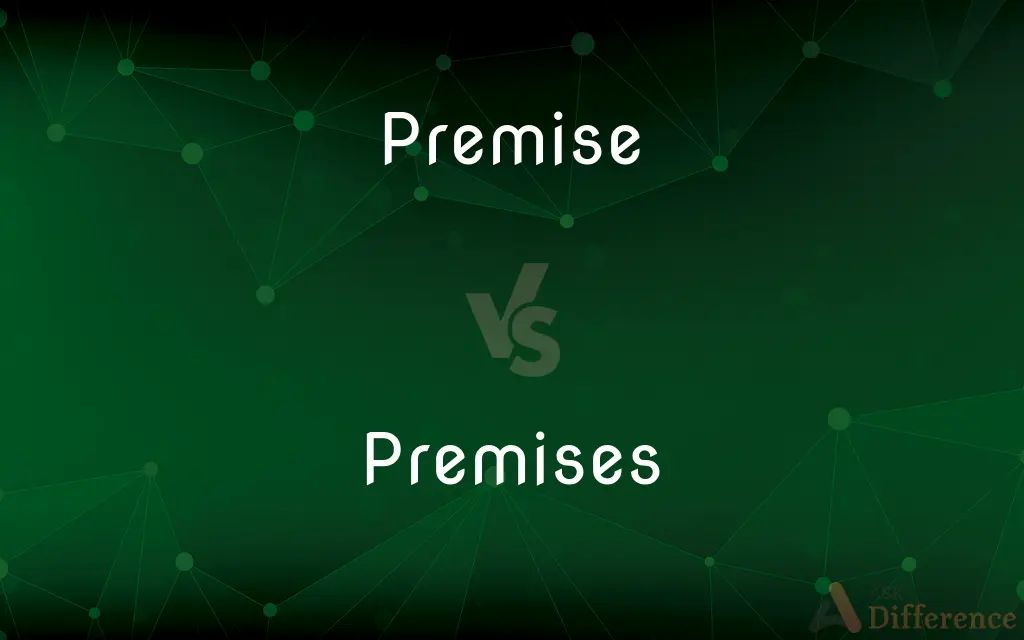Premise vs. Premises — What's the Difference?
By Fiza Rafique & Urooj Arif — Updated on February 22, 2024
A premise is a statement or idea that forms the basis for a reasoning, while premises refer to buildings or land associated with a business or institution.

Difference Between Premise and Premises
Table of Contents
ADVERTISEMENT
Key Differences
A premise in an argument or logical structure serves as the foundation or starting point from which conclusions are drawn. It's a statement or proposition that is assumed to be true and is used to support an argument or reasoning. For example, in a debate, a speaker might start with the premise that "All humans are mortal" to build further arguments.
Premises, on the other hand, typically refer to the physical buildings and land occupied by a business or institution. This term is often used in legal, real estate, and business contexts to describe the location of an operation or the extent of property owned or leased by an entity. For instance, a company might discuss security measures for its premises.
A premise is an abstract concept used in logical, philosophical, and rhetorical contexts, whereas premises are concrete and relate to physical spaces. This distinction is crucial in understanding the appropriate context and application of each term.
The plurality of "premises" does not imply multiple locations or arguments but is a traditional legal term that has been adopted into general usage. Even a single building or piece of land is referred to as "premises," not "premise," in the context of property.
Understanding the difference between premise and premises helps avoid confusion, especially in written and spoken communication, ensuring clarity whether discussing abstract ideas or physical locations.
ADVERTISEMENT
Comparison Chart
Definition
A statement or idea forming the basis of an argument
Buildings and land occupied by a business or institution
Context
Logical, philosophical, rhetorical
Legal, real estate, business
Nature
Abstract concept
Physical property
Usage
Singular and plural (premises) as multiple statements
Always plural in form but can refer to a single location
Example
Used in formulating arguments or hypotheses
Used in discussing property, location, or physical spaces
Compare with Definitions
Premise
Assumed truth in logic.
The logical premise If A, then B underpins many proofs.
Premises
Business location or property.
The company's premises were equipped with advanced security systems.
Premise
Basic statement for argument.
The premise of her argument was that climate change affects weather patterns.
Premises
Physical space for operations.
Smoking is not allowed on the premises.
Premise
Foundation for reasoning.
His conclusion was based on the premise that all markets are efficient.
Premises
Legal term for land and buildings.
The lease agreement includes all the premises and outbuildings.
Premise
Starting point for discussion.
The debate used the premise that technology improves productivity.
Premises
Site of an institution.
The school expanded its premises to include a new sports complex.
Premise
Hypothetical condition.
The experiment's premise was that light affects plant growth.
Premises
Real estate property.
The premises were evaluated for environmental compliance.
Premise
A premise or premiss is a statement that an argument claims will induce or justify a conclusion. It is an assumption that something is true.
Premises
Premises are land and buildings together considered as a property. This usage arose from property owners finding the word in their title deeds, where it originally correctly meant "the aforementioned; what this document is about", from Latin prae-missus = "placed before".In this sense, the word is always used in the plural, but singular in construction.
Premise
To make a premise; to set forth something as a premise.
Premises
Land and buildings together considered as a place of business.
Bread is baked on the premises.
Premise
A proposition upon which an argument is based or from which a conclusion is drawn.
Premise
To state or assume something as a proposition to an argument.
Common Curiosities
What is the primary difference between a premise and premises?
A premise is an idea or statement for reasoning, while premises refer to physical buildings or land.
Is a premise always used in arguments?
Primarily, yes, a premise is used as the basis of an argument or logical reasoning.
Can premises be used in a non-physical sense?
Typically, no, premises refer to tangible property, not abstract concepts.
Why is premises always plural?
It's a traditional legal term that has retained its plural form even when referring to a single location.
Can premises be virtual?
Generally, premises imply a physical space, so they are not used to describe virtual locations.
Can the term premise be plural?
Yes, in the context of arguments, you can have multiple premises (ideas or statements) supporting a conclusion.
How does the meaning of premise change in different contexts?
The core meaning of premise as a foundational statement remains consistent across contexts, emphasizing its role in reasoning.
What's an example of a logical premise?
An example is "If it rains, the ground gets wet," where the premise is the condition of raining.
How is the term premises commonly used?
Premises is commonly used in legal, real estate, and business contexts to describe property locations.
How do premises impact a business?
The location, size, and facilities of business premises can significantly affect operational efficiency and customer perception.
Can premises refer to a single building?
Yes, premises can refer to a single building or piece of land, despite its plural form.
Are premises only associated with businesses?
Primarily, but premises can also refer to the physical space of institutions, organizations, or any entity occupying land or buildings.
Do all arguments have premises?
Most logical arguments or debates start with at least one premise as the foundation for reasoning.
Is understanding premises important in legal contexts?
Yes, in legal contexts, understanding premises is crucial for issues related to property rights, leases, and liabilities.
Is it correct to use 'premise' when referring to property?
No, the correct term for referring to property is 'premises.'
Share Your Discovery

Previous Comparison
Seaweed vs. Tangle
Next Comparison
Rail vs. TrainAuthor Spotlight
Written by
Fiza RafiqueFiza Rafique is a skilled content writer at AskDifference.com, where she meticulously refines and enhances written pieces. Drawing from her vast editorial expertise, Fiza ensures clarity, accuracy, and precision in every article. Passionate about language, she continually seeks to elevate the quality of content for readers worldwide.
Co-written by
Urooj ArifUrooj is a skilled content writer at Ask Difference, known for her exceptional ability to simplify complex topics into engaging and informative content. With a passion for research and a flair for clear, concise writing, she consistently delivers articles that resonate with our diverse audience.














































